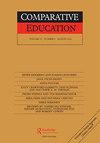British Scholars of Comparative Education: Examining the Work and Influence of Notable 19th and 20th Century Comparativists
IF 3.7
1区 教育学
Q1 EDUCATION & EDUCATIONAL RESEARCH
引用次数: 5
Abstract
Clearly, this text will be mandatory reading for specialists in comparative education. It is of major importance as a contribution to grasping the beginnings and historical trajectories of the fi eld, sharpening contemporary debates and evoking future research possibilities. Strate-gically, the book explores the work and in fl uence of British scholars ‘ on the way in which comparative studies in education developed over the past 150 years ’ (1); ‘ the pivotal role played by each scholar in driving a progression through humanistic and scienti fi c approaches to new epistemological traditions ’ (i). It is structured on the basis of chronology: it starts with essays on the nineteenth- and early twentieth-century work of Matthew Arnold and Michael Sadler, continues with chapters on Nicholas Hans, Joseph Lauwerys, Brian Holmes, Edmund King, and Vernon Mallinson, and fi nishes with re fl ections on the more recent scholarship of Nigel Grant, W.D. Halls, Margaret Sutherland, Colin Brock and Peter Jarvis. Certainly, the quality of the writing in the essays is uneven – some of the writing is a bit dull, while other writers o ff er praise far too easily and have clearly not thought hard about the challenges of biographical research (Roberts 2002); but overall, the book is a solid contribution to the literature and provokes thought about our ‘ iconography ’ . The英国比较教育学者:考察19世纪和20世纪著名比较学家的工作和影响
显然,本文将是比较教育专家的必读书目。它对掌握该领域的开端和历史轨迹,尖锐当代辩论和唤起未来研究可能性的贡献具有重要意义。从策略上讲,这本书探讨了英国学者“在过去150年教育比较研究发展的道路上”的工作和影响(1);“每位学者在推动人文主义和科学方法向新的认识论传统发展方面所发挥的关键作用”(i)。它以马修·阿诺德和迈克尔·萨德勒在19世纪和20世纪早期的作品开始,接着是尼古拉斯·汉斯、约瑟夫·劳韦里斯、布莱恩·霍姆斯、埃德蒙·金和弗农·马林森的章节,最后是对奈杰尔·格兰特、w·d·霍尔斯、玛格丽特·萨瑟兰、科林·布洛克和彼得·贾维斯最近的学术研究的反思。当然,文章的写作质量参差不齐——有些写作有点枯燥,而另一些作者则过于轻易地赞美,显然没有认真思考传记研究的挑战(罗伯茨2002);但总的来说,这本书对文学做出了坚实的贡献,并引发了对我们的“图像学”的思考。的
本文章由计算机程序翻译,如有差异,请以英文原文为准。
求助全文
约1分钟内获得全文
求助全文
来源期刊

Comparative Education
EDUCATION & EDUCATIONAL RESEARCH-
CiteScore
7.40
自引率
21.20%
发文量
35
期刊介绍:
This international journal of educational studies presents up-to-date information with analyses of significant problems and trends throughout the world. Comparative Education engages with challenging theoretical and methodological issues - and also considers the implications of comparative studies for the formation and implementation of policies - not only in education but in social, national and international development. Thus it welcomes contributions from associated disciplines in the fields of government, management, sociology - and indeed technology and communications - as these affect educational research and policy decisions.
 求助内容:
求助内容: 应助结果提醒方式:
应助结果提醒方式:


